|
|
|
Sort Order |
|
|
|
Items / Page
|
|
|
|
|
|
|
| Srl | Item |
| 1 |
ID:
097625
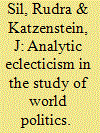

|
|
|
|
|
| Publication |
2010.
|
| Summary/Abstract |
This article defines, operationalizes, and illustrates the value of analytic eclecticism in the social sciences, with a focus on the fields of comparative politics and international relations. Analytic eclecticism is not an alternative model of research or a means to displace or subsume existing modes of scholarship. It is an intellectual stance that supports efforts to complement, engage, and selectively utilize theoretical constructs embedded in contending research traditions to build complex arguments that bear on substantive problems of interest to both scholars and practitioners. Eclectic scholarship is marked by three general features. First, it is consistent with an ethos of pragmatism in seeking engagement with the world of policy and practice, downplaying unresolvable metaphysical divides and presumptions of incommensurability and encouraging a conception of inquiry marked by practical engagement, inclusive dialogue, and a spirit of fallibilism. Second, it formulates problems that are wider in scope than the more narrowly delimited problems posed by adherents of research traditions; as such, eclectic inquiry takes on problems that more closely approximate the messiness and complexity of concrete dilemmas facing "real world" actors. Third, in exploring these problems, eclectic approaches offer complex causal stories that extricate, translate, and selectively recombine analytic components-most notably, causal mechanisms-from explanatory theories, models, and narratives embedded in competing research traditions. The article includes a brief sampling of studies that illustrate the combinatorial potential of analytic eclecticism as an intellectual exercise as well as its value in enhancing the possibilities of fruitful dialogue and pragmatic engagement within and beyond the academe.
|
|
|
|
|
|
|
|
|
|
|
|
|
|
|
|
| 2 |
ID:
175158
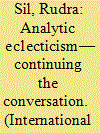

|
|
|
|
|
| Summary/Abstract |
In this response to the contributions in this symposium, I approach the above articles not as wholesale critiques requiring point-by-point rebuttal but as constructive engagements that require clarification or invite further reflection as part of an ongoing conversation. In some instances, I revisit and elaborate upon the main motivations and assumptions that Peter Katzenstein and I had in mind as we sought to lay out the significance of analytic eclecticism for different audiences. At other times, I take it upon myself to consider aspects of our approach that might be updated or reframed in light of concerns raised by some of the authors. I specifically address four issues that have been raised: the core logic of analytic eclecticism and its operationalization with respect to once-dominant paradigms in International Relations; the link between complexity, causality, and constitutive logics; the status of metatheory and the links between eclecticism and pragmatism; and the relationship between scholarly debates and “real-world” issues of policy and ethics. Whether the response is satisfactory or not, it is worth bearing in mind that, for Peter Katzenstein and myself, analytic eclecticism was always meant to be more of an ethos than a method or manifesto; that ethos long predates our published work and is evident in the thoughtful contributions that constitute this symposium.
|
|
|
|
|
|
|
|
|
|
|
|
|
|
|
|
| 3 |
ID:
107813
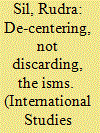

|
|
|
|
|
| Publication |
2011.
|
| Summary/Abstract |
The authors are sympathetic to much of David Lake's argument in his critique of paradigmatic 'isms' in the field. However, they also seek to qualify his diagnosis of the problem and critically assess some of his prescriptions and his efforts to manage epistemological divides in the field. In the process, the authors also clarify certain aspects of 'analytic eclecticism'.
|
|
|
|
|
|
|
|
|
|
|
|
|
|
|
|
| 4 |
ID:
151555
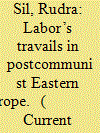

|
|
|
|
|
| Summary/Abstract |
“After the fall of communism, the restructuring of labor became an integral part of the larger project of building democracy and markets.” Sixth in a series on labor relations around the world.
|
|
|
|
|
|
|
|
|
|
|
|
|
|
|
|
| 5 |
ID:
052163
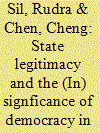

|
|
|
| 6 |
ID:
116437
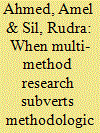

|
|
|
|
|
| Publication |
2012.
|
| Summary/Abstract |
While acknowledging the many forms and contributions of multi-method research (MMR), we examine the costs of treating it as best practice on the grounds that it reduces method-specific weaknesses and increases external validity for findings. Focusing on MMR that combines some type of qualitative analysis with statistical or formal approaches, we demonstrate that error-reduction and cross-validation are not feasible where methods are not sufficiently similar in their basic ontologies and their conceptions of causality. In such cases, MMR may still yield important benefits-such as uncovering related insights or improving the coding of variables-but these can be readily obtained through collaboration among scholars specializing in single-method research (SMR). Such scholars often set the standards for the application of particular methods and produce distinctive insights that can elude researchers concerned about competently deploying different methods and producing coherent findings. Thus, the unchecked proliferation of multi-method skill sets risks forefeiting the benefits of SMR and marginalizing idiographically-oriented qualitative research that fits less well with formal or quantitative approaches. This would effectively subvert the pluralism that once gave impetus to MMR unless disciplinary expectations and professional rewards are predicated on a more balanced and nuanced understanding of what various forms of SMR and MMR bring to the table.
|
|
|
|
|
|
|
|
|
|
|
|
|
|
|
|
| 7 |
ID:
134499
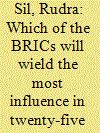

|
|
|
|
|
| Summary/Abstract |
Edward Mansfield (this issue) offers a twofold appraisal of the significance of rising powers—defined here as the BRIC countries—for the study of international political economy (IPE). On the one hand, current approaches in IPE suffice to explain the behavior of rising powers since none threatens the present architecture of the global economy or the positions of the United States and European Union (EU). On the other hand, one rising power, China, has managed to surpass the others in military and economic capabilities, warranting a closer examination of the linkages between political economy and national security. While this view seems eminently reasonable, I argue that forecasting the relative material capabilities of the BRICs over a longer period, say over the next quarter century, requires stretching the boundaries of IPE to pay close attention to incremental changes in demographic patterns and in the geographic distribution of vital resources. Such factors are difficult to capture in the ontologies of conventional IPE theories; yet, over the long run, they may well determine the upper limits for a rising power's capabilities in the global economy. With this in mind, I offer the following tentative proposition: Russia is the BRIC country with the best prospects for boosting both its global economic clout and its population's living standards over the next quarter century.
|
|
|
|
|
|
|
|
|
|
|
|
|
|
|
|
| 8 |
ID:
077630


|
|
|
|
|
| Publication |
Seattle, University of Washington Press, 2006.
|
| Description |
viii, 301p.
|
| Standard Number |
9780295986289
|
|
|
|
|
|
|
|
|
|
|
|
Copies: C:1/I:0,R:0,Q:0
Circulation
| Accession# | Call# | Current Location | Status | Policy | Location |
| 052393 | 335.43/TIS 052393 | Main | On Shelf | General | |
|
|
|
|
|
|
|
|
|